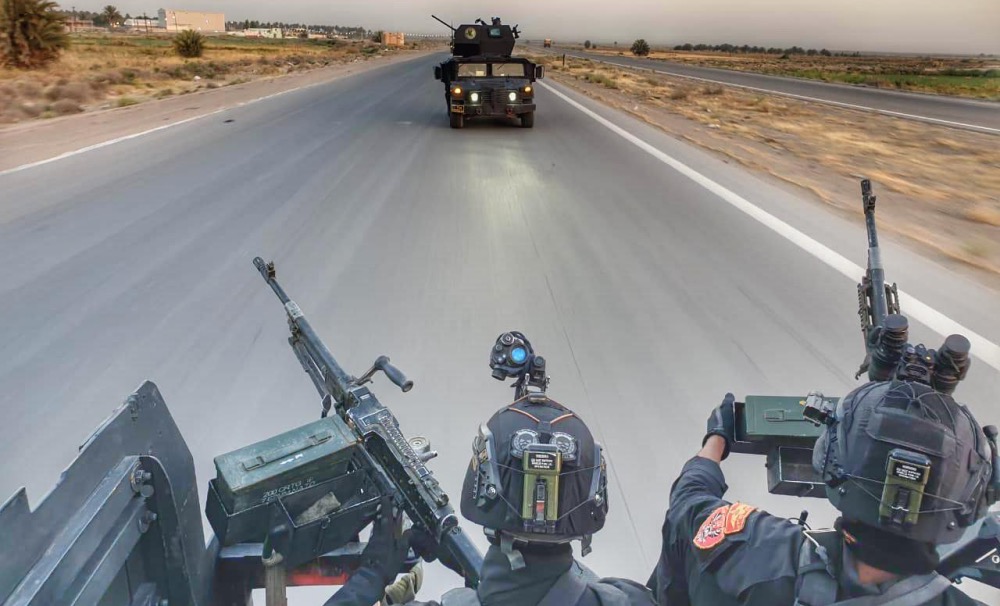Pentagon: Iraqis are incredibly skilled at fighting terrorism
Pentagon: Iraqis are incredibly skilled at fighting terrorism
2024-10-14 04:54
 Shafaq News/ The US Department of Defense “Pentagon” stated that the international coalition to defeat ISIS still considers it necessary to continue the war against the terrorist organization and its ideology, through multilateral efforts, including with Iraq, even though the organization has lost its ability to control territory.
Shafaq News/ The US Department of Defense “Pentagon” stated that the international coalition to defeat ISIS still considers it necessary to continue the war against the terrorist organization and its ideology, through multilateral efforts, including with Iraq, even though the organization has lost its ability to control territory.
The Pentagon explained in a report on its website, translated by Shafaq News Agency, that ISIS invaded Iraq and Syria in 2014 and posed a threat to millions of people across the region through its evil rule that adopted murder, rape and genocide, including against the Yazidis, of whom at least five thousand were killed, and that the organization controlled Mosul and was directly on the outskirts of Baghdad.
The US report considered that the credit for liberating the vast territories controlled by ISIS is largely due to the US-led coalition of countries to defeat ISIS, which the report described as “pioneering a new and effective way to confront this global threat.”
The report quoted the Defense Department Coordinator for the Global Coalition to Defeat ISIS, Alan Matney, as saying that the terrorists no longer control territory, but the ideology adopted by the group persists, and the coalition is still needed.
“If we’ve learned anything in the last 10 years of the coalition, I would say that this threat has not gone away, it is changing and adapting,” Matni said, adding, “What we’re in now is a normal, healthy phase where we’re adapting.”
In the interview, Matney points out that the coalition has shifted over the past decade from activities focused on retaking territory from the terrorist organization to charting ISIS’s next moves and its next victims, explaining that “groups like ISIS are constantly assessing their strengths and weaknesses, and trying to reposition themselves to take advantage of that, and we are doing the same thing.”
The report quoted Matni as saying that ISIS, like other terrorist groups, has a primary goal of expanding its operations, explaining that ISIS “deliberately wants us to overreact or respond in a way that is strategically impossible to sustain, and wants us to use so many resources that individual states cannot do it.”
Matni stressed that the international coalition was indeed “our main tool to counter this strategy, and we collectively distributed the burden of opposing ISIS effectively, and we continue to do so effectively today.”
He explained that the coalition’s method of operation changed from focusing on military confrontation with the enemy in the field, to the process of exchanging intelligence information.
He continued by saying that the term “D-ISIS”, which is an abbreviation for “defeat ISIS”, is achieved by training partner countries to combat terrorism, and it is a burden that is also distributed among these countries.
Regarding Iraq, the report quoted Matni as saying that the international coalition is working with the Iraqi security forces, adding that the Iraqis have become “incredibly skilled in counterterrorism operations, really skilled partners,” adding, “We also have local partners in Syria who are highly skilled and highly capable.”
According to Matni, as a result of the successes of the international coalition, ISIS has faced much greater difficulties in its activity in Iraq and Syria, and is currently trying to operate in West Africa, Somalia, Afghanistan and Southeast Asia, warning that the organization has once again become a “mysterious terrorist organization” and has infiltrated places that are difficult to find, which requires “different methods of how to pursue it, which is part of our adaptation.”
After Matni pointed out the advantages provided by the presence of the coalition, especially since the United States no longer has the same presence that it had before in places like Afghanistan or West Africa, explaining that “although we do not have a great degree of knowledge about what is happening day after day, we have 87 partners and we have collective strengths.”
He pointed out that the coalition represents a “unique multilateral organization, and it does not operate by consensus like the United Nations or NATO,” noting that the requirements of such consensus can come at the expense of speed and flexibility, but the international coalition against ISIS is much smarter and faster, and no member state has the right of “veto.”
“There’s nothing wrong with a country not being part of a process,” he continued. “But there will be 9 or 15 or 20 partners who will be part of it. That was really powerful.”
shafaq.com
